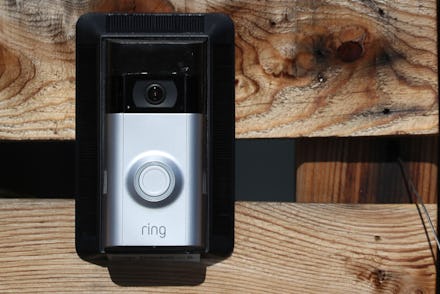Over 30 civil rights groups demand an end to Amazon's surveillance partnerships with police

A surveillance network has expanded right under our noses in one of the places you may least expect — people's doorbells. Since acquiring smart-doorbell company Ring in February 2018, Amazon's built an extensive network of cameras across the country, and it's sharing the information it gets. Now, 36 civil rights groups demand Amazon's police partnerships end in an open letter released yesterday.
Published by digital rights advocacy group Fight for the Future, the open letter demands local, state, and federal officials end their partnerships with Ring. In addition, it calls on Congress to investigate Ring's practices, and for local governments to pass surveillance ordinances to "deter" police from partnering with companies like Ring again.
Currently, Amazon partners with over 400 police departments, signifying rapid growth of the program. Through the partnership, Ring gives police a tool called the Law Enforcement Neighborhoods Portal. It functions as an interactive map showing the approximate location of all Ring camera owners in the area and lets police request footage directly from them.
Last December, Amazon went so far as to partner with GPS tracking company 7P Solutions and the United States Postal Inspection Service to carry out a sting operation with the Aurora, Colorado Police Department. "Operation Grinch Grab" didn't catch catch any package thieves, but did help the police with a public relations boost.
In a recent tweet, Fight for the Future referred to Amazon's network as a "privately run, for-profit surveillance dragnet". The letter itself addresses surveillance concerns, stating:
"Amazon Ring partnerships with police departments threaten civil liberties, privacy and civil rights, and exist without oversight or accountability. Given its significant risks, no surveillance partnerships with Amazon Ring should have been established, or should be established in the future, without substantial community engagement and input and elected official approval."
While the practices outlined in the open letter are shady enough, this isn't the first time Amazon has partnered with police and raised surveillance concerns.
Amazon is also the creator of a facial recognition program called Rekognition. The program is infamously known for its difficulty reading anyone who isn't a white man. In July 2018, an ACLU test of Rekognition found that it falsely matched 28 members of Congress to mugshots, including six members of the Congressional Black Caucus.
A January 2019 study at M.I.T. Media Lab also showed that Rekognition has greater errors in recognizing darker-skinned women. Researcher and founder of the Algorithmic Justice League, Joy Buolamwini, testified before Congress that she resorted to wearing a white mask to have her face detected by Rekognition.
However, the problem extends far beyond whether or not Rekognition can read Black people, and extends into how it can be used to cast a widespread surveillance net. The ACLU discovered that Amazon sold Rekognition to at least two law enforcement agencies and pitched the program to Immigration and Customs Enforcement (ICE).
And although Amazon Ring denies any connection to facial recognition software, the Washington Post reported that Ring filed two patents in November 2018 “that describe technology with the ability to identify 'suspicious people' and create a “database of suspicious persons.”
"As facial recognition software has been shown to disproportionately misidentify people of color, women and transgender people, it further compounds existing civil liberties concerns and expands suspected criminality centered in racial profiling and gender bias," the civil rights groups' open letter said.
By manufacturing and selling paranoia, Amazon's Ring puts Black communities at unique risk. Other organizations who have signed onto the letter include the Media Justice, Color of Change, Muslim Justice League, The Black Alliance for Just Immigration (BAJI), MPower Change, Mijente, and more.